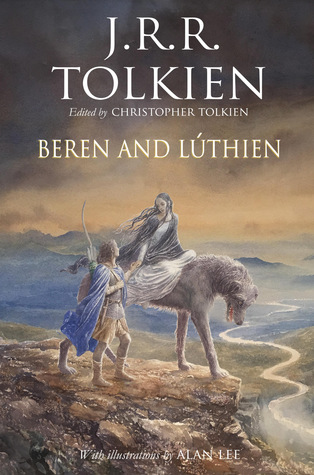3.5 Stars
A labor of love. Not just Beren's feats to win Lúthien, but also Christopher Tolkien for his father and his apparently enormous oeuvre. This is an archivist's weaving of the fragments of the tale of Beren and Lúthien from a selection of separate works to relay the most complete, yet, not rewritten telling of this love story.The verse in the various cantos and Quenta is lyrical, mesmerizing, and beautiful. While the publisher pushed Tolkien for prose and the result, The Lord of the Rings, is wonderful, the verse and Tolkien's love of heroic poetry is resplendent.
'Be he friend or foe, or demon wild
of Morgoth, Elf, or mortal child,
or any that here on earth may dwell,
no law, nor love, nor league of hell,
no might of Gods, no binding spell,
shall him defend from hatred fell
of Feanor's sons, whoso take or steal
or finding keep a Simaril.
These we alone do claim by right,
our thrice enchanted jewels bright.'
Or:
From wall to wall she turned and wheeled
in dance such as never Elf nor fay
before devised, nor since that day;
than swallow swifter, than flittermouse
in dying light round darkened house
more silken-soft, more strange and fair
than sylphine maidens of the Air
whose wings in Varda's heavenly hall
in rhythmic movement beat and fall.
While this is a self-contained telling of the story of Beren and Lúthien pulled from various works and unpublished pieces, the largest being "The Lay of Leithian". I still feel like I might have been better off if I had read The Silmarillion, first. It's not that Christopher Tolkien does a bad job, if anything I think the work and dedication clearly evident in pulling the fragments together into a coherent whole is admirable, but there is context that I'm missing. Nonetheless, watching the story change as the years progress is very interesting.
Tolkien's love of language is at the forefront and there are so many things which tickled my brain as I read. Various references to Norse mythology, Rapunzel theme with Tinúviel, and an interesting interplay between Chinese and Japanese, which in a post-WWI context would be fun to explore further. I do like to see the hints of history that pepper through his work.
Huan, Hound of Valinor means "change" in Chinese, a great wolfhound that is pictured on the cover. He is a critical character in the story. Beren's trial include being thrall to the evil Prince of Cats, Tevildo which in one variant is referred to as Ainu, name of the indigenous peoples of Japan. So, there are definitely political themes relevant to Tolkien referenced. Frankly, I'm curious if the added storyline of Kili/Tauriel in the Hobbit movie was influenced by Beren and Lúthien.
There are some lovely image plates accompanying the story. I recommend this for Tolkien fans only.


